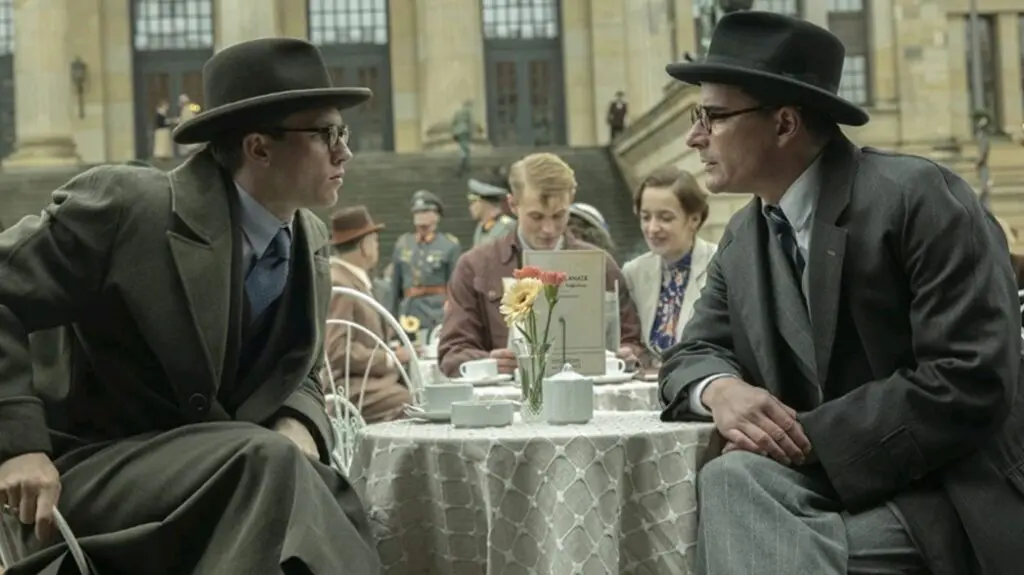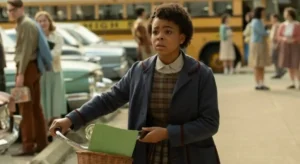Summary
Munich: The Edge of War is a piece of historical fanfiction that becomes an exciting war-time battle of wits.
This review of the Netflix film Munich: The Edge of War does not contain spoilers.
Director Christian Schwochow’s adaptation of the Robert Harris novel Munich is one of those movies that doesn’t have to fire off a gun to create suspense and palpable tension. This film, like the book, explores a speculative history of what may have happened during what many consider disastrous peace talks during the 1938 Munich Agreement. It’s the type of work that will invite criticism but shield itself from it because of freely admitting its alternate takes that are a work of fiction. Also, Munich: The Edge of War has modern theories from scholars that now come around on one of the film’s primary subjects.
The subject is Neville Chamberlain (Watchmen’s Jeremy Irons). At the time, the United Kingdom Prime Minister dealt with an annoying little man with a chip on his shoulder. Adolph Hitler (Downfall’s Ulrich Matthes) is about to invade Czechoslovakia. This gives a young German diplomat, Paul von Hartmann (Je Suis Karl’s Jannis Niewöhner) he needs to arrest him. (This appears to be the start of Operation Valkyrie). However, Hitler was convinced to attend the peace talks, which delayed the insurrection.
Paul, though, has an ace up his sleeve. He comes across damning physical evidence of the Führer’s plans. Not only plans to invade the lands of the Bohemian Crown but all of Europe. Even the world. He wants to have Chamberlain not sign the treaty, so he contacts his young aide, Hugh Legat (1917‘s George MacKay), with who he was once friends at Oxford six years prior. (Apparently, even Nazis deserve a quality education). They had a falling out because of Paul’s fanatical enthusiasm for Hitler’s German pride parades. This eventually led to fascist tendencies and policies that had harassment of German Jewish citizens.
It is important to note that Munich: The Edge of War is not revisionist history, like Once Upon a Time… In Hollywood, as much as it is a speculative one. Chamberlain, a figure who died in disgrace for the outbreak of World War 2, but has later been given a reprieve by modern scholars, has his actions explored by Harris and screenwriter Ben Powers (The Hollow Crown) here. At the same time, Irons plays Chamberlain as the public perceived him: aloof, like the Ronald Reagan of England. Even camera hungry. So, while many felt having Hitler sign a joint statement was a sign of weakness, there was a purpose behind it. It gave England political clout to declare war later if needed. And possibly pull in more significant powers, like the United States.
This makes the story interesting, but Schwochow’s film becomes gripping, even exciting, as an against time thriller. That is primarily due to MacKay’s Hugh and Niewöhner’s Paul, who build tension and suspense with a cat and mouse game with implications of the fate of the world in the balance. MacKay, who seems to find himself in film after film of him running long distances to give authorities important messages, is so perplexed here his performance becomes nail-biting.
However, Niewöhner’s altruistic and passionate von Hartmann gives the film’s star-making performance. As soon as he walks on the screen, you see a movie star. I’m sure the team making him look like a Tom Holland doppelgänger helped, but he is the heart and soul of the film. His last scene, lamenting over a lost opportunity, is haunting. (It is important to remember these two characters are fictional).
Ultimately, this is a piece of fact-based historical fan fiction about sacrifice and the greater good. The difference here is by letting go of facts and giving yourself over to speculation, Munich: The Edge of War builds genuine suspense and becomes an exciting war-time battle of wits in the process.
What did you think of the Netflix film Munich: Edge of War? Comment below!




